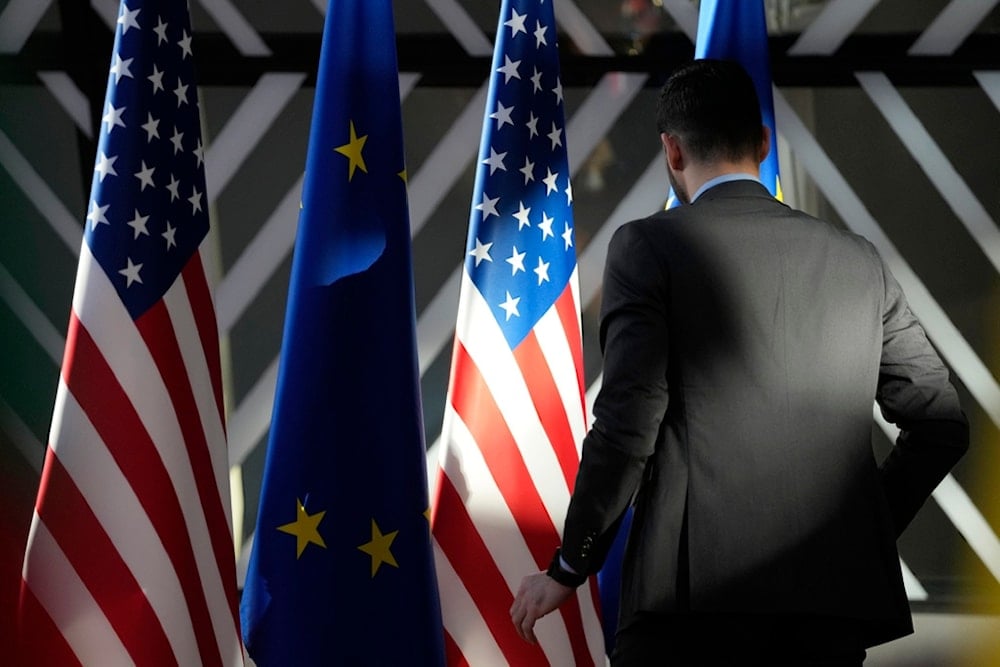Europe must boost defenses amid US foreign policy shift: Le Monde
Europe has the means to regain its footing in defense but needs substantial policy changes, according to writers Alexandr Burilkov and Guntram Wolff.
-

A worker adjusts the US and EU flags prior to the arrival of European Union foreign policy chief Josep Borrell and United States Secretary of State Antony Blinken during the EU-US Energy Council Ministerial meeting at the European Council building in Brussels, Tuesday, April 4, 2023. (AP)
An opinion piece published by writers Alexandr Burilkov and Guntram Wolff for Le Monde on Thursday argues that Europe must urgently strengthen its defense capabilities amid increasing isolation, a sentiment underscored by Donald Trump's recent electoral victory in the US presidential race.
The authors contend that Europe's reliance on American military protection is no longer sustainable, as the US appears set to shift its focus toward "Israel" and the geopolitical tensions with China, deprioritizing Europe's security needs.
Burilkov and Wolff highlight the limitations of America's military might, which they argue is compromised by a "crumbling defense industrial base."
This weakened foundation, they note, challenges the US's ability to fulfill its global defense commitments, especially given the lengthy and high-intensity nature of modern warfare, which demands robust industrial capacity to sustain equipment and personnel over time.
While the US continues to support Ukraine's war with Russia, its industrial resources are struggling to keep pace with those of Russia.
This, the authors argue, exposes a critical vulnerability for Europe, which could find itself without sufficient support should American commitments waver.
Read more: Trump's return signals major shake-up in foreign policy: The Guardian
The authors cite the billions of dollars the US has allocated to bolster "Israel's" air defenses and counter Yemeni operations, which has resulted in diminished resources for NATO's European installations.
This "unsustainable" scenario leaves Europe's security in jeopardy, underscoring the need for EU nations to act swiftly to close the defense gap.
Can the EU regain footing?
According to the piece, Europe has the means to regain its footing in defense but needs substantial policy changes. First, Burilkov and Wolff call for long-term, credible defense budget commitments from major European nations, especially Germany, to achieve the scale and continuity required for effective defense production.
They advocate for financing mechanisms, including bonds at both the national and EU levels, to fund large-scale defense projects like air defense systems that offer extended utility.
They also emphasize the importance of encouraging defense companies to invest in industrial-scale production by ensuring stable funding, while smaller, innovative firms require more access to financing.
The writers suggest that institutions like the European Investment Bank could play a role by supporting defense projects, thereby signaling the broader financial sector to reconsider its hesitancy around defense investments.
Read more: Draghi urges radical EU reform requiring extra 800 billion yearly
The article further notes the need for joint procurement agreements among EU nations to increase production volumes, reduce unit costs, and standardize equipment to improve interoperability—a need highlighted by NATO's fragmented approach to defense standards, which they argue has weakened Europe's collective military effectiveness.
The authors urge the EU to step in and enforce NATO standards to streamline costs and bolster European defense capabilities.
Moreover, Burilkov and Wolff caution against an overly restrictive "buy European" policy. Instead, they advocate for a pragmatic approach, where Europe prioritizes resident companies to maintain strategic autonomy while collaborating with non-European allies when it is more efficient or strategically necessary.
They reference the recent Trinity House agreement between Germany and the UK as a promising example of such collaboration.
Read more: UK, Germany consider developing long-range weapon to hit Russian nukes
In conclusion, Burilkov and Wolff assert that Europe cannot afford to delay strengthening its defense industry.
As Russia advances its military capacity and the US faces increasing limitations, Europe's ability to safeguard its own security is at stake.
They call for immediate, decisive action to ensure Europe is prepared for future challenges, emphasizing that reliance on the US will no longer suffice in an increasingly multipolar world.

 4 Min Read
4 Min Read








